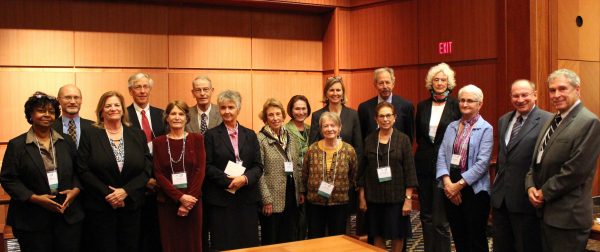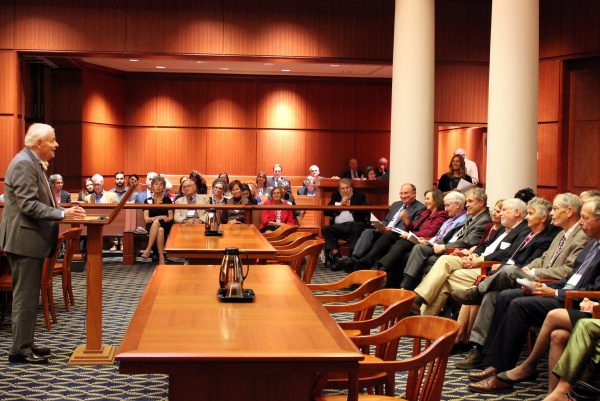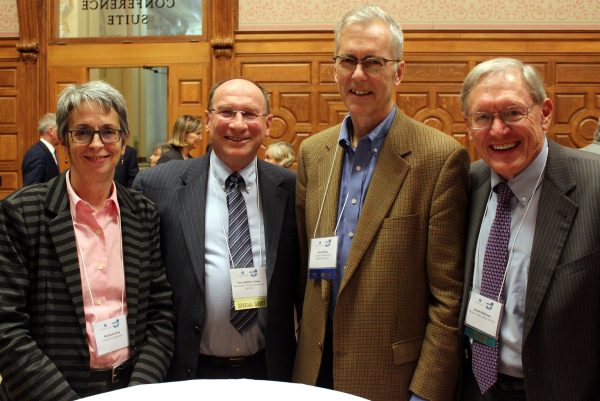Access to Justice Fellows Program Kicks Off Sixth Year

Over 100 members of Boston’s nonprofit and legal communities gathered at the Adams Courthouse on October 12 to help Lawyers Clearinghouse and the Massachusetts Access to Justice Commission kick off another year of the Access to Justice Fellows Program.
Created in 2012 to address the need for more civil legal services, the founders of the Fellows Program recognized the potential for senior attorneys and retired judges to serve their communities. They believed that if these experienced lawyers volunteered to work with nonprofits, legal services organizations, and the courts, they could help close the “justice gap” that leaves so many unable to access the legal help they desperately need.
To date, 94 Fellows have signed on, devoting over 70,000 hours of pro bono service collectively to over 60 partner organizations. This year’s class of 20 Fellows is engaged in a wide range of projects related to environmental conservation; legal guardianship of children with special needs; the representation of undocumented, unaccompanied minors; nonprofit strategic planning; and more.
Following opening remarks from Program Director Susan Gedrick, attendees heard from Hon. Edward M. Ginsburg. The founder of Senior Partners for Justice and a longtime supporter of access to justice efforts, Judge Ginsburg was there to introduce Vickie Rothbaum, a member of the 2014-2015 Fellows class.

Judge Ginsburg spoke about how Vickie came to him almost six years ago with an inspiring idea to make court services more accessible. A week and a few phone calls later, they had put together the Settlement and Early Resolution Volunteers (SERV) program.
Operating within the Suffolk County Probate and Family Court, SERV pairs trained conciliators–who are experienced family law attorneys–with low-income, unrepresented litigants who are struggling to navigate the court system.
A former family law attorney, Vickie elected to continue her work with SERV when she became a Fellow in 2014. After Judge Ginsburg invited her up to the podium, she explained how SERV has impacted many people and families, helping them break the vicious cycle of repeated court appearances and the resulting stress and loss of pay. The program has been so effective that it has now expanded to the Essex County Probate and Family Court.
Even though her formal fellowship ended in 2015, Vickie is still hard at work with SERV. She said multiple Fellows– Steve Greenzang, Ann Baum, and Arlene Bernstein–have volunteered with SERV, and she hopes to recruit more in the coming years.
“As an Access to Justice Fellow, it has been inspiring to see the enormous dedication of attorneys who have partnered with important causes to promote access to justice for so many,” she said.
Fellows Program co-founder Sue Finegan, a Member at Mintz Levin, then took the podium.
“When Martha Koster and I started this program about 6 years ago, we started with this lofty goal: we had hoped that when every lawyer throughout the country was thinking about retiring, they would ask themselves: ‘What would I do for my Fellowship year and how could I give back?’” she said.

Sue said she and Martha had encountered some skepticism when they pitched the idea to organizations. But they also encountered some “yes’s,” particularly from the Lawyers Clearinghouse, which now manages the program, and from Supreme Judicial Court Chief Justice Ralph D. Gants.
“He immediately said, ‘Yes,’ and he jumped in with both feet,” she said.
Justice Gants gave the final remarks of the evening. He noted that Sue and Martha’s vision of a nationwide movement was starting to become a reality, as the Louisiana Access to Justice Commission recently announced plans to adapt the Fellows Program model, and he praised the program for reinventing what it means to retire.
“It is an extraordinary contribution to the pro bono effort, and moreover it has also changed the vision of what it means to be transitioning from one practice to another,” he said. “Each of these individuals are leaving accomplished practices in the law, some are accomplished jurists. It is a great pleasure for me to introduce them and welcome them into this family of Access to Justice Fellows.”